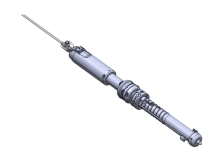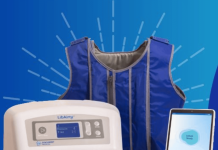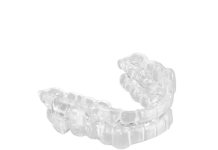Carthera, a spin-off from Sorbonne University and developer of SonoCloud®, an innovative ultrasound-based medical device to treat a wide range of brain disorders, today announces the successful closing of its €37.5M ($40M) Series B financing round. A prominent (undisclosed) investor led the round, alongside the European Innovation Council Fund (EICF) and historic investors, including Panakès Partners, Relyens Innovation Santé (Turenne Santé) and Supernova Invest with its Supernova 2 fund.
Carthera will use the proceeds to launch the first pivotal multicenter trial with its SonoCloud technology. These funds will also enable it to continue developing its clinical pipeline and technology.
Currently, Carthera is in the process of submitting its registration trial in recurrent glioblastoma (GBM) to the US Food and Drugs Administration (FDA) and EU competent authorities. The study will be an international, multicenter, two-arm clinical trial randomized with a 1:1 ratio. It will be an open-label, comparative pivotal trial evaluating the clinical benefit, in terms of overall survival, of the SonoCloud-9® system, when used to open the Blood Brain Barrier (BBB) after carboplatin chemotherapy administration. This will be compared to the standard of care (lomustine and temozolomide) in patients with first recurrence of GBM.
In parallel, the company will continue developing its SonoCloud technology platform in brain oncology and neurodegenerative indications.
“Having treated more than 100 patients in Europe and the US with the SonoCloud system, with almost 500 treatment procedures performed, for Carthera to be able to continue exploring the benefit of opening the BBB by ultrasound with the financial support of renowned investment funds is a great achievement. Together with Professors Roger Stupp, Ahmed Idbaih and Adam Sonabend, we are very positive about the upcoming clinical trials. We firmly believe that the SonoCloud system can improve treatment options for patients,” said Professor Alexandre Carpentier, head of the neurosurgery department at AP-HP Sorbonne University, inventor of the SonoCloud and founder of Carthera.
RELATED: Augmedics raises $82.5 million to accelerate adoption of augmented reality spine surgery
Carthera’s SonoCloud is an implantable ultrasound device that temporarily opens the BBB on demand. Its excellent feasibility and safety profile has been proven with multiple therapeutic agents in repeated sonication procedures. The recent publication by a team of Northwestern researchers (Chicago, Illinois) in Lancet Oncology demonstrated the ability of SonoCloud-9 to substantially increase the penetration of therapeutic molecules in the brain. Another publication, currently under review, will present the potential increase in survival due to better chemotherapeutic efficacy in the treatment of brain tumor patients, when used concomitantly with BBB opening with the SonoCloud. These encouraging results translate into excellent motivation among clinical investigators for ongoing and upcoming studies.
“We are pleased to continue supporting Carthera in its next step towards its first pivotal trial in recurrent glioblastoma, since the initial results have been very positive in this indication,” said Diana Saraceni, founder and managing partner at Panakès. “We also believe its ultrasound-based platform technology has the potential to address many of the most challenging therapeutic indications in the neurodegenerative field. We are very proud to be part of this journey.”
“We are delighted with the outcome of our Series B funding round. The company is now in a strong position to launch an ambitious phase 3 trial and pursue the evaluation of its SonoCloud technology in multiple clinical indications,” said Frédéric Sottilini, CEO of Carthera. “In the next few years we are aiming at first market approval for our SonoCloud-9 device for the treatment of recurrent glioblastoma and we are eager to pursue the development of our proprietary platform technology in other brain diseases with significant unmet needs.”
Financial advisor: Andrew Amiel
Legal advisors: White and Case and Egyp Avocats
About SonoCloud®
SonoCloud is an innovative medical device developed by Carthera. It emits ultrasound to temporarily increase the permeability of the blood vessels in the brain to improve the delivery of therapeutic molecules. Invented by Pr. Alexandre Carpentier and developed in collaboration with the Laboratory of Therapeutic Applications of Ultrasound (Laboratoire Thérapie et Applications Ultrasonores, LabTAU, INSERM) in Lyon, France, SonoCloud is an implant inserted into the skull and activated prior to injection of a therapeutic agent. Several minutes of low-intensity ultrasound opens the blood brain barrier for six hours and increases the concentration of therapeutic molecules in the brain. This ultrasound-induced opening of the blood-brain barrier is a world first; it offers a new treatment option for a wide range of indications, including brain tumors and Alzheimer’s disease.
The safety of the investigational use of the SonoCloud has not yet been determined, the device has not yet received EMA or FDA approval.
About Carthera
Carthera is a clinical-stage medtech company focused on developing innovative ultrasound-based medical devices to treat a wide range of brain disorders.
The company is a spin-off from AP-HP Paris and Sorbonne University. Carthera leverages the inventions of Pr. Alexandre Carpentier, head neurosurgeon at AP-HP Sorbonne university, who has achieved worldwide recognition for his innovative developments in treating brain disorders. Carthera is developing SonoCloud®, an intracranial implant that temporarily opens the Blood-Brain Barrier (BBB). The device is currently in clinical trials in Europe and the United States.
Founded in 2010, Carthera has offices in France (Lyon and Paris) and a subsidiary in the United States. Since its inception, the technical and clinical development of SonoCloud has received support from the National Research Agency (ANR), the French public investment bank (Bpifrance), the National Institutes of Health (NIH) and the European Innovation Council (EIC).




